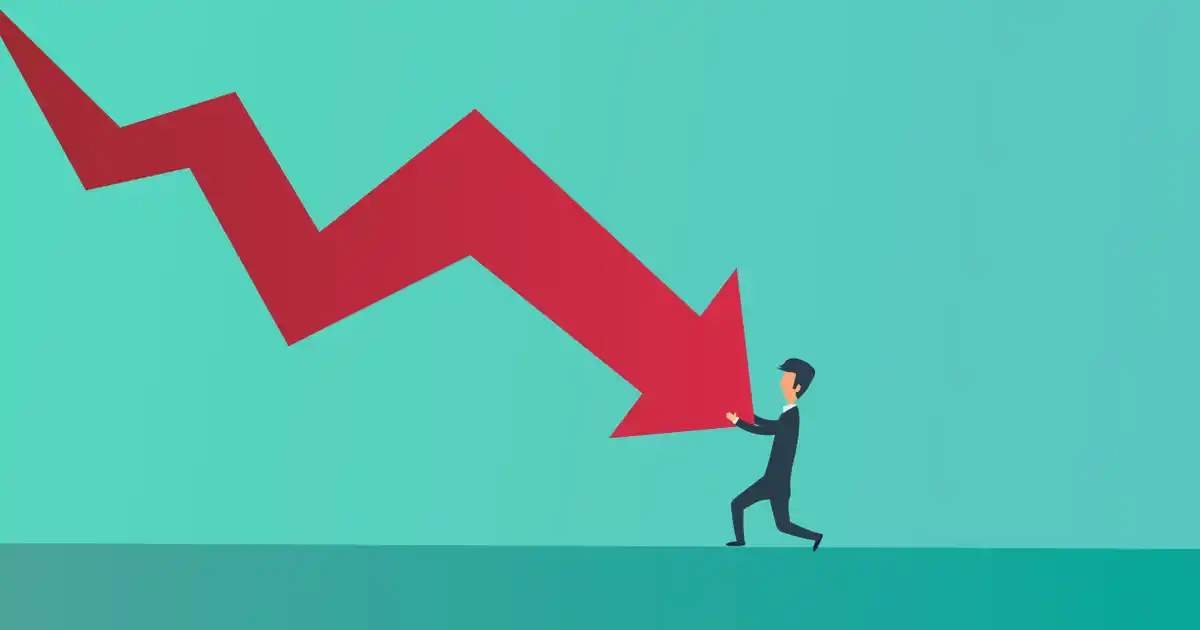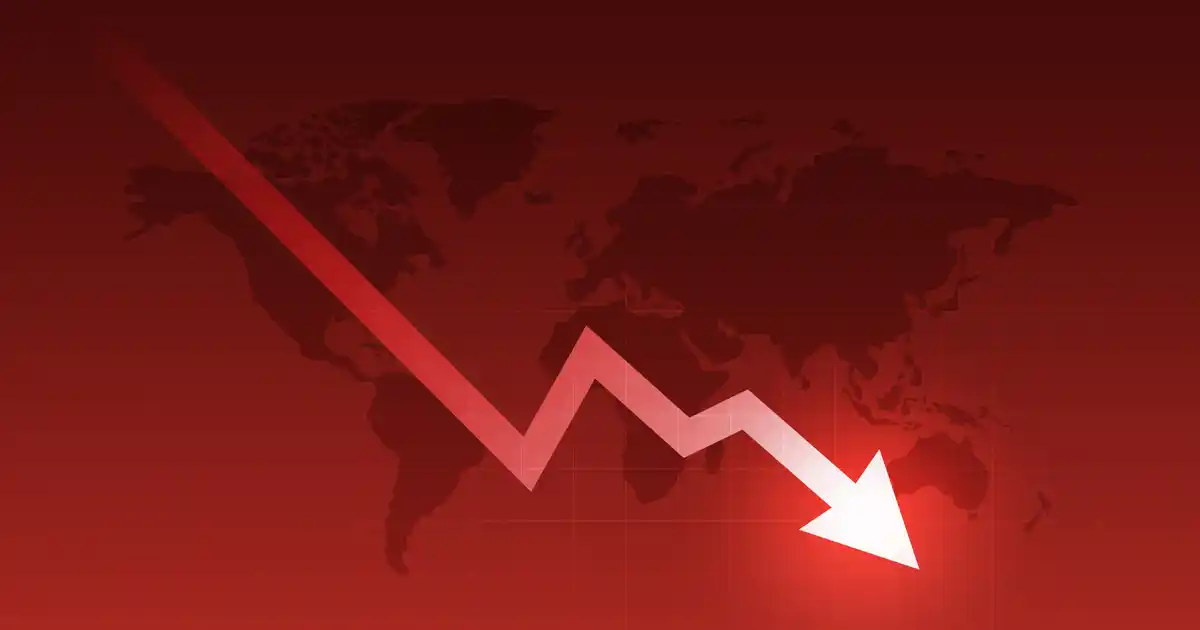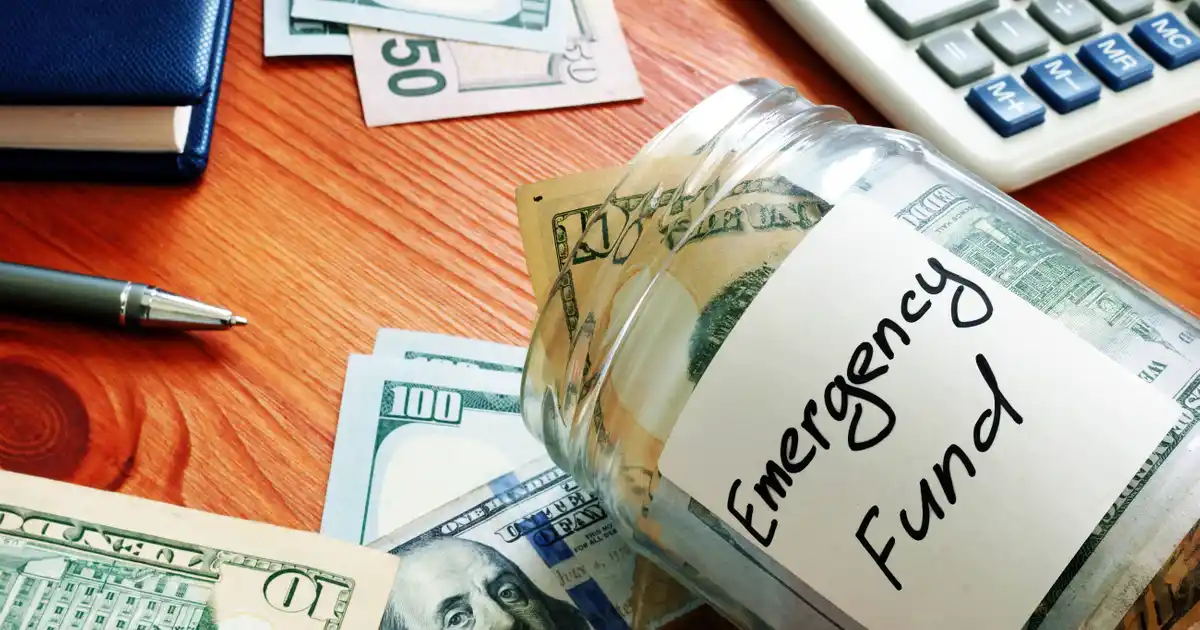- A recession is a prolonged period of economic decline, measured by a region’s GDP (along with other factors).
- The onset of the pandemic in March 2020 ended 129 consecutive months of economic expansion — the longest such period in history.
- Recessions lead to high unemployment, business failures, and sometimes even bank failures. Luckily, recessions have historically never lasted more than about a year.
Whether you’ve been paying attention or not, the overall economy isn’t looking too hot these days. After two years of general havoc caused by the pandemic, we’re now dealing with huge inflation rates, a roller coaster housing market, interest rate hikes, and a stagnant stock market. Oh, and a huge cryptocurrency bubble seemingly popped, if you’re into that sort of thing. Although nothing has been officially declared, it certainly feels like we’re headed into another recession. It’s a depressing thought for most of us.
If the United States (and other first world countries) do end up dipping into an official recession, don’t panic. There are a few ways you can help protect yourself and limit the financial blows. Some of these things you can even start right now, before a recession officially begins. Other tips will work best down the road, if the economy continues to flounder. But before we start talking about how to prepare for a recession, let’s quickly define exactly what a recession is.
What is a Recession?
By classic definition, a recession is two consecutive quarters of significant economic decline in a designated region. Or in other words, at least six months of flat or declining GDP. There are often other accompanying factors too, such as a rise in unemployment. The National Bureau of Economic Research is the oversight body that officially declares recessions.
In light of the past two years, they say that the definition of recession has been altered slightly. Two quarters of GDP decline is no longer the measuring stick. Instead, they say that a recession is defined as “a significant decline in economic activity spread across the economy, lasting more than a few months, normally visible in real GDP, real income, employment, industrial production, and wholesale-retail sales.”
 Shutterstock
ShutterstockRecession vs. Depression
While the words rhyme and have similar meanings, a recession is not the same as a depression. Not financially speaking, anyway. A recession typically impacts employment and production. Families interrupt their normal spending habits until things start to turn around.
A depression, on the other hand, is more widespread (and can even spread globally). It comes with ultra high unemployment numbers and an overall pause in economic activity. In simple terms, a depression is what happens when a recession gets really bad and lasts for three years or longer, or spreads from one region to other places around the world.
The last true depression in North America was the Great Depression in the early 1930s. It was a period of economic decline that lasted over three and a half years. Even still, many families were left dealing with the fallout of the Great Depression for decades.
 Shutterstock
ShutterstockExamine Your Spending Habits
Now that we’ve defined a recession, what can you do about it? Unfortunately, you don’t control the amount of money that the Feds print, nor the interest rates they set. You probably can’t influence investing decisions and policy making at major financial institutions either. So while you can’t stop a recession from forming, you can adjust your own household budget accordingly. It’s not fun, and sacrifices will need to be made. The good news, though, is that it’s possible to ride out the storm and emerge on the other side poised for growth.
Let’s start really simple: take a close look at your spending habits. Look for things you can easily cut back on or live without for a bit. Maybe order a bit less take out or trim your digital subscriptions a bit. This stuff can really add up quickly. In a recession, your opportunities to earn extra money via a side-hustle or a promotion are often limited. Instead, try to spend a bit less.
 Shutterstock
ShutterstockFocus on High-Interest Debt
There are multiple approaches to tackling your debts. In fact, we’ve covered a variety of useful debt repayment methods on our site before. Some of them work better than others, psychologically. It can be encouraging to tackle the smallest debts first and watch them get wiped off the board. Mathematically, however, there’s only one true answer: pay off the highest interest debt first.
This advice is double true in times of a recession (or looming recession). Those high interest rates will cost you hundreds, even thousands, of extra dollars over the years. That’s money literally just draining your already limited budget. If you’re trying to make the most out of every penny, pay off your highest interest debt first (probably your credit cards) and then go on to your next most costly debt (maybe a line of credit or car loan?). Don’t forget to keep making minimum payments on all your debts while you focus on the most expensive one.
 Shutterstock
ShutterstockCan You Increase Your Income?
We already told you that increasing your income can be difficult in a recession. Those gig-economy jobs tend to dry up or pay less and your employer may be tightening their own belts too. That means that raises, bonuses, and promotions may be fewer and far between during recession times. However, that doesn’t mean you shouldn’t still be at least trying to raise your income.
It’s easier than ever to get freelance jobs in industries that you’re already qualified in. Ride sharing and delivery services aren’t going away either. If you have strong health insurance and 401(k) benefits with your main employer, seeking out a part-time job that only offers an extra paycheck isn’t as hard to swallow. And of course, you can always professionally (and with adequate evidence) request a raise, promotion, or change in job title from your manager at work. If they are trying to keep their best employees, they know that helping them through record inflation rates will go a long way to instill loyalty.
 Shutterstock
ShutterstockFocus on Career Development
Even if you can’t get your hands on more income right away, that doesn’t mean you can’t plan ahead. A recession is one of the best times to focus on your career development. Talk to your manager about your role and see if they can recommend certain courses, certifications, or additional responsibilities that will take you to the next level.
There are plenty of additional skills you can learn online, from the comfort of your own home. The recession won’t last forever, and your resume will stand out when companies start ramping up their hiring again. Consider this an investment in yourself that will pay off when the economy swings back up.
 Shutterstock
ShutterstockStart (or Keep) Investing
We know it can be discouraging to look at the stock market during a recession. Lots of red numbers and graphs that plummet down. But rest assured, it’s happened before. Things always bounce back eventually. If you already have a bunch of money saved in a 401(k) or IRA plan, it can be hard to watch. You may be tempted to cash out the money and hide it in your closet. Resist that urge and ride it out. The value will go up again.
If you haven’t started investing for retirement yet, a recession is actually the perfect time. While it may seem counter-productive to earmark money for investments when your budget it already tight, here’s out counterpoint: stocks are currently on sale. The market has seen drops anywhere from 10-to-50%, depending on the sector. Those stocks are basically discounted right now. So go ahead and start putting some money into a mutual fund or ETF right now. Your gains will come, in time.
 Shutterstock
ShutterstockSpeaking Of Investments…
While we’re on the subject of investments, here’s one additional piece of advice. Don’t try to pick individual stocks or time the market. This is almost always a losing play. You might think that Tesla is primed to bounce back, so you sink all your money into their stock. But that’s just a single company (run by a terminally online narcissist). You can’t predict what it will do.
Instead, focus on index funds with less risk. The NASDAQ or S&P 500, for example, are collections of stocks, made up of hundreds of different companies. Even if a handful of them make costly decisions, the others should more than balance things out. You’re unlikely to watch your money disappear during a bad week on Wall Street. Other things to consider are bonds, precious metals (like gold), or real estate investing via a Real Estate Investment Trust (REIT).
 Shutterstock
ShutterstockBuild An Emergency Fund
Yes, we need to mention yet another thing you should do with your money that isn’t a basic necessity like housing, food, or transportation. However, an ample emergency fund is an important financial tool in any kind of economy, recession or not. And don’t confuse available credit as being a good substitution for a rainy day fund, because it’s not.
Experts say that your emergency fund should cover three-to-six months worth of expenses. That may seem like an unclimbable mountain, especially if you’re starting at $0. But you have to start somewhere, right? Start tucking a little bit away every time you get paid. Even if it’s only $10 or $20. Make it a habit. That money will quickly grow.
One extra note, though. You should only pad your emergency fund once the high interest debt is taken care of. There’s no sense tucking away an extra $100 a month when your credit card balance is costing you $75 a month in interest charges.
 Shutterstock
ShutterstockMake a Budget (and Stick To It)
If we’re being honest (and a bit preachy), you should already have a budget. It’s an important financial tool for any household. But, once again being honest with ourselves, we know that plenty of people don’t use a budget. They just kind of wing it from week to week, month to month, and hope that they bring in enough money to cover expenses as they pop up. It’s a dangerous and stressful way to live, but lots of people feel like they don’t have much of a choice.
However you decide to form your budget is fine. You can go old school with pen and paper, or use one of the many useful budgeting software apps available. Be honest with yourself about all your routine expenses. Don’t forget your Spotify, Netflix, or DisneyPlus fees. Having a detailed budget will give you a better idea of where you stand, financially.
 Shutterstock
ShutterstockDon’t Panic
This is maybe the hardest part of living through a recession. Everywhere you look, it’s another headline about exploding inflation, record high gas prices, interest rates going up, and the stock market bleeding red. It’s pretty easy to think that the entire financial system is teetering on the verge of total collapse. But seriously, don’t panic.
A quick look through history shows us that these periods of boom and bust come in waves. We recently had ten years of excellent economic growth and the market was due for a correction. Sure, the pandemic was a surprise twist that added a bunch of additional financial pressure. Regardless, recessions (and even depressions) don’t last forever. Follow the above tips and stay the course. When the graphs start to trend in the right directions again, you’ll be ready to take full advantage.
 Shutterstock
ShutterstockThe Bottom Line
Although we’re not officially in a recession right now, it certainly feels like one. Goods and services are more expensive than ever, the stock market is in a lull, and everyone — both citizens and companies — are being more frugal with their money. Plenty of hard working Americans are concerned about their financial state right now, and rightfully so.
However, recessions don’t last forever. Some prices will go back down. The stock market will rise again. And incomes will (slowly) start going back up. In the meantime, watch your discretionary spending, focus on your career goals, and stick with (or start) your investing plans. The road to financial success is a long marathon, not a short sprint. A period of recession is just one small part of the overall journey.
 Shutterstock
Shutterstock







